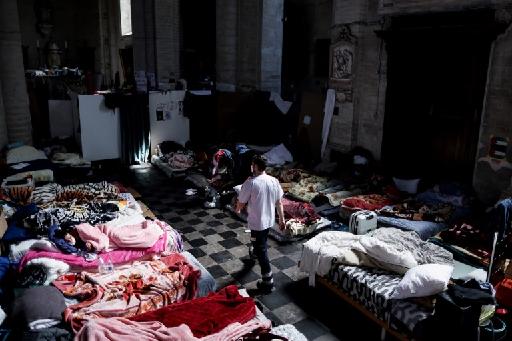About 100 persons staged a demonstration on Saturday in support of undocumented migrants currently on a hunger strike at the Béguinage Church in Brussels, the Vrije Universiteit Brussel (VUB) and the Université Libre de Bruxelles (ULB).
“They are fighting with their bodies solely for humanity and dignity,” the demonstrators said. “The silence and deafness of the authorities with respect to the fate of these persons must cease.”
Undocumented persons have been fighting for years for the right to work. They have been asking to be incorporated into professions facing labour shortages and other sectors that have been finding it difficult to fill vacancies during the novel Coronavirus (COVID-19) pandemic.
Having a profession is a basic precondition for regularisation on the basis of work, but the migrants also face additional hurdles, as Father Daniel Alliet pointed out.
"Do you know, for example, that the profession of domestic helper is not recognised as a labour-strapped profession, whereas a survey shows that no woman with a Belgian nationality wishes to exercise that profession?” he asked.
“Many of these people are already exercising this profession clandestinely. They want nothing more than to be able to do so officially,” Father Daniel said. “They also need to be paid officially, but that is ‘too expensive,’ so to speak. That’s why this profession is not recognised as a labour-strapped one.”
Lawyer Alexis Deswaef feels there needs to be a clear law with clear criteria for regularisation. “These are people who can no longer be regularised since their residence-permit applications are ‘inadmissible’,” he noted. “They first have to return to their countries of origin and file the application from there. If they do so, they will of course be told to remain there.”
"The law needs to be amended so that these persons no longer face this ‘inadmissibility,’ but can focus on their insertion into society, their professional career or their children’s education,” the lawyer added. “It’s much too easy for politicians to show their muscles to a particular electoral base."
The Brussels Times

